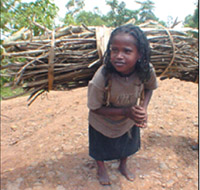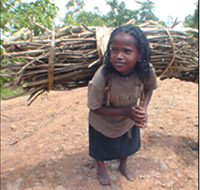
Addis Ababa’s former fuel wood carriers lead bright, colorful new lives as weavers [Archives:2008/1149/Last Page]
April 24 2008
 |
Yemenis and other visitors to Addis Ababa long have been struck by this city full of colors. Mosques and churches are painted bright turquoise and banana yellow; restaurant interiors and even roadway billboards are resplendent in tropical greens and pinks. But the most vibrant colors are found in the cloth woven by former female fuel wood carriers.
Located in the foothills of the Entoto Mountains lies a barracks-like concrete building filled with 13 looms and numerous spare parts stacked up against each other. Light filters in through the wire covering the windows, creating a pattern on the floor. This might not seem like an optimal work environment, but for the group of women looming cloth here, this is a paradise far from the horrors of their past of collecting fuel wood in the nearby eucalyptus forests.
According to the World Bank, which funds a program for an estimated 15,000 female fuel wood carriers – known as WFCs – in the capital of Addis Ababa, 90 percent of Ethiopia's energy comes from biomass fuels like wood and charcoal.
Women like Kiongete Jemal, who carried fuel wood from the mountains into Addis Ababa for 15 years, risk their health and sometimes their lives just to make their living this way.
The work is physically strenuous and the women constantly fear attack or rape by Ethiopian security forces monitoring the forests to ensure that the women aren't cutting down the eucalyptus trees, which are protected by law because they are an endangered resource. The women technically are only allowed to collect branches or wood that falls off the trees naturally.
“There were no options and no other jobs,” said Jemal, who began carrying fuel wood at age 10. “Even if we knew it was bad, it was the only choice.”
“The guards hassled us and there were rapes,” said Kozoi Kunta, another WFC who spent 18 years carrying wood down to Addis Ababa from the Entoto forests. She said she was overjoyed when she heard about the opportunity to work in a safe and stable environment, earning living wages for herself and her family.
The Ministry of Women's Affairs and the Former Women Fuel Wood Carriers Association, or FWFCA, administers the project, which recruits women in the forests and offers them an alternative: learning how to loom, embroider and design everything from tablecloths to dresses with high-quality Ethiopian cotton.
The association spends eight months training the women, but only after they've proven themselves ready and able to truly change their lives. They are asked, “If you have an alternative, are you willing to start from zero again?” explained Elias Enat, an employee working on the financial end of the program, “We then prioritize the real [serious] ones.”
“They came to the forest to talk to us and said, 'You'll be able to have a better life,'” Kunta recalled while spinning yarn on a low wooden stool, “When I heard this, I was so happy.”
FWFCA's weaving workshops are close enough to the hills to be able to see the current fuel wood carriers trekking back down to the city, huge bales of sticks strapped to their hunched-over backs. It's hard to imagine Jemal ever doing that job, as she looks completely comfortable and even dainty while pushing the loom back and forth.
The association also has 12 designers, including Jemal, who are trained in tailoring for two and half years. She has been weaving for eight years now and her favorite things to create are dresses.
Once the designing and weaving are completed, the tangerine scarves and pale yellow bedspreads are sold at a nearby women's cooperative shop, from which the weavers receive the bulk of the returns. It's a small shop, but tended with care, also by former fuel wood carriers. The saleswoman offers customers beverages as they peruse the tiny sales floor, which is packed to the brim with the cotton creations.
Although, as Jemal said, “Anything is better than collecting wood because of the hard labor,” this job in particular seems to suit her. For Jemal and the other WFCs, the loom creates not only new garments, but new lives as well.
——
[archive-e:1149-v:18-y:2008-d:2008-04-24-p:lastpage]


